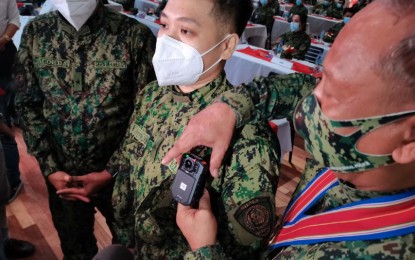
BODY CAMS. PNP Director for Logistics, Maj. Gen. Angelito Casimiro demonstrates the use of body cameras during the training for police officers at the NCRPO headquarters in Camp Bagong Diwa, Taguig City on Friday (Feb. 26, 2021). The use of body cameras is part of efforts to ensure transparency and accountability in the conduct of police operations. (PNA photo by Lloyd Caliwan)
MANILA – The Philippine National Police (PNP) on Friday started its training on the use of body cameras for police officers as part of efforts to ensure accountability in law enforcement operations.
Members of the National Capital Region Police Office (NCRPO) were the first to undergo training at the NCRPO headquarters in Camp Bagong Diwa, Taguig City.
PNP Director for Logistics, Maj. Gen. Angelito Casimiro said each police station would be given 16 body cameras, eight of which will be used by patrolling operatives while the remaining eight will be reserved for other operations.
These will also be equipped with SIM cards that would be used to feed videos to the PNP Command Center.
The body cameras are waterproof and can record video for up to eight hours. The officers wearing them cannot interfere with its configuration and they cannot turn these off until they go off duty.
Casimiro said this proves that technological breakthroughs are helpful in the police force's conduct of its programs and projects.
"The DL (Directorate for Logistics) has been active in advancing its logistical programs and projects to support the operations and administration of the PNP we should not be immobilized by the fear of this pandemic but instead we should endure and overcome as one," Casimiro told reporters.
"We in the DL firmly believe that as time progressed, we should also advance with our means and methods on how to better serve the public and the country's national police force," he said.
He added that body-worn camera systems are very crucial in police operations because it improves evidence collection and preservation.
"Also, it enhances police transparency and legitimacy as well as civility of police citizen encounters, which create a huge impact on our policing and in the criminal justice system as a whole," he said.
The PNP has acquired around 2,696 body-worn cameras and their associated systems from San Juan City-based EVI Distribution Inc.
As for operations protocol, Col. Benjamin Santos, PNP Command Center chief, said these cameras can be used not only for illegal drug operations but also on other law enforcement operations.
“The use of body worn camera is based on all planned operations. All operations must be planned, both police operations which include other law enforcement operations. These can be used not just for anti-criminality, it can be used in checkpoint, chokepoint, or to secure events like the vaccination drive,” he said.
However, he said the use of these body cameras will be based on the discretion of the ground commanders.
The body cameras are set to be distributed to all police stations nationwide by the end of March and can be used by police officers starting April. (PNA)
